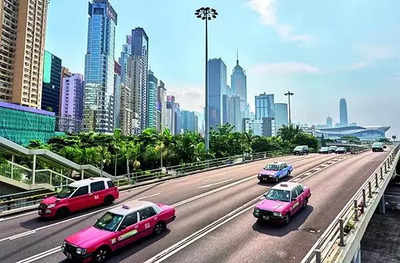HONG KONG: The air is laced with cigarette smoke and profanities as a half-dozen taxi drivers hang out by their fire-engine-red cabs in the gritty Prince Edward neighbourhood of Hong Kong. It is the afternoon handover, when day-shift drivers pass their taxis to those working in the night. They are surrendering cash to a taxi agent, a matriarchal figure who collects rent for the vehicles, manages schedules, and dispenses unsolicited advice about quitting smoking. The drivers wave her off.
There may be no harder task in this city of more than 7 million than trying to change a taxi driver’s habits. Often grumpy and rushing to the next fare, cabbies in Hong Kong have been doing things their way for decades. But taxi drivers are under pressure to get with the times. Their passengers are fed up with being driven recklessly, treated curtly and, in many cases, having to settle fares with cash. The practice is so ingrained that airport staff often have to alert tourists at taxi ranks that they need to carry bills.
The govt – both because of the complaints and to revitalise tourism – has tried to rein in taxi drivers. Officials ran a campaign last year urging drivers to be more polite. They imposed a point system in which bad behaviour by drivers, such as overcharging or refusing passengers, would be tracked and could result in the loss of licenses. In early Dec, the govt proposed requiring all taxis to install systems to allow them to accept credit cards and digital payments by the end of 2025, and to add surveillance cameras by the end of 2026. Predictably, many cabbies have opposed the idea. “Would you want to be monitored all the time?” said Lau Bing-kwan (75). “The govt is barking too many orders.”
The new controls, if put in place, would signal the end of an era for an industry that has long been an anomaly in Hong Kong’s world-class transportation system. To many cabbies, the impatience and brusqueness is a reflection of their harsh reality: When scraping by in a business with shrinking financial rewards, no time can be wasted on social niceties. For instance, Lau Man-hung, 63, skips meals and bathroom breaks just to stay behind the wheel long enough to take home about $2,500 a month, barely enough to get by in one of the most expensive cities in the world.
Tension between the public and taxi drivers plays out with mutual finger-pointing. When the govt introduced the courtesy campaign, a driver told a reporter that it was the passengers who were rude. “There is an impression among the public that all taxi drivers are bad when most of them just want to earn a living,” said Hung Wing-tat, a retired professor who has studied the taxi industry.




